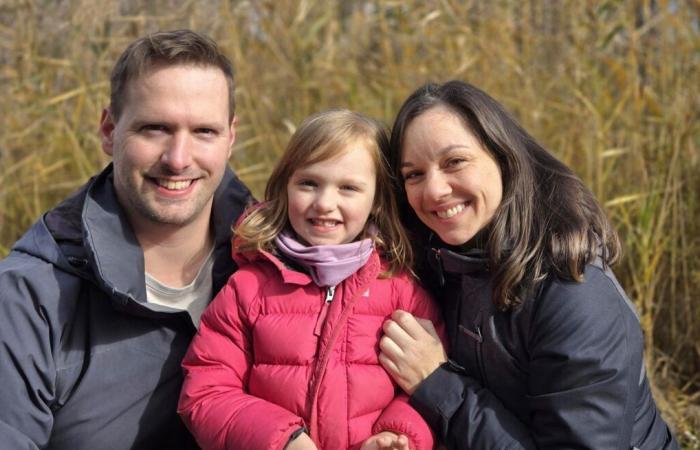This text is part of the special Philanthropy section
An innovation from the Montreal Children’s Hospital makes it possible to better predict genetic predispositions to develop cancer and detect the disease early. The globally used MIPOGG (McGill Interactive Pediatric OncoGenetic Guidelines) app is also used in the care facility’s new Cancer Predisposition Syndrome Clinic.
There was no program specifically dealing with patients and families at genetic risk of cancer, the D found.re Catherine Goudie upon her arrival as a hemato-oncologist and pediatrician at the Montreal Children’s Hospital in 2018. The one who is also a clinician-researcher at the research institute of the McGill University Health Center thus set up this program with her now equips and cares for around 200 children. “They have a range of genetic mutations that predispose them to having cancer during their youth and even as adults,” she explains.
For one in ten children with cancer, the disease is due to a genetic predisposition, assesses the doctor. The new specialized clinic therefore takes care of these patients. She also takes under her wing clients who do not currently have cancer, but in whom a genetic problem has been detected exposing them to a greater or lesser risk of developing one.
A recent program
Today, the MIPOGG application is used to assess the possibilities that the illness of little patients was caused by a genetic problem. “It’s a free system, offered in both languages and which asks very specific questions about childhood cancer. It takes a maximum of two minutes,” explains the doctor. The tool will conclude whether the patient is at high or low probability of living with cancer predisposition syndrome.
Such a system therefore makes it easier to direct these patients towards genetic resources. “Sometimes, it will directly affect the way we treat this child”, by favoring or avoiding certain types of care, underlines the Dre Goldie.
And when they find a genetic cause in a child with cancer, doctors can screen the rest of his family. “So, we may succeed in limiting the damage in the future,” explains the hemato-oncologist.
Those who are not currently sick, but who have a genetic predisposition to developing certain cancers, will be tested periodically. “The goal is to detect cancer early, when it is easier to treat,” summarizes Catherine Goudie. Thus, surgeries can be less cumbersome, and chemotherapy treatments, less aggressive.
Among the doctor’s patients is little Raphëlle Rosamilia. She was only a few months old when she was diagnosed with hemihypertrophy in 2021. This congenital anomaly results in one part or side of the body growing more than the other. The D teamre Goudie soon after confirmed the presence of Beckwith-Wiedemann syndrome, the symptoms of which include a larger tongue and organs. This genetic condition increases the risk of developing pediatric cancer.
“I felt so sorry for my baby who had to have blood tests and ultrasounds every three months,” says Eve Rosamilia, Raphaëlle’s mother, with emotion. But at the same time there is something reassuring in knowing that she is being watched. »
A few months later, a routine ultrasound detected Wilms tumor, a type of kidney cancer, in Raphaëlle. “The day before, she had an appointment with her family doctor, who concluded that she was in perfect health. And, the next day, we finally learned that there were two masses on his kidneys, one of which was the size of a file,” says M.me Rosamilia. “It was really a shock,” adds Samuel Garant, the little girl’s father.
After several chemotherapy treatments and an operation, the child is now out of danger. “Did it save his life?” I cannot answer, but Raphaëlle would surely have had more after-effects if she had not been followed,” underlines Mr. Garant.
Essential donations
Innovations like the MIPOGG application can see the light of day thanks to philanthropy, explains Renée Vézina, president of the Montreal Children’s Hospital Foundation. “About twenty years ago, patients who suffered from certain cancers died from them. But now, for some of them, their chances of survival are excellent,” she emphasizes.
The estimated cost for the opening of the Cancer Predisposition Syndrome Clinic and the two phases of development of the MIPOGG application is $6 million. To date, the Montreal Children’s Hospital Foundation has raised 2.4. This initiative is part of its vast Panser differently campaign, launched in 2019, with the aim of raising a total of $200 million.
The Dre Goudie would soon like to refine his tool so that it will be able to accurately determine the genetic syndrome from which the child suffers from among the range already identified. The funds obtained from donors will be used to finance these advances and to develop new approaches to follow patients with a genetic predisposition to develop cancer. “Without philanthropy, this program simply would not exist,” she concludes.
This content was produced by the Special Publications team at Dutyrelating to marketing. The writing of the Duty did not take part.






